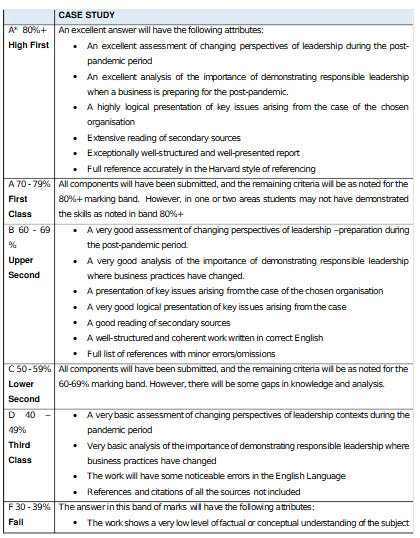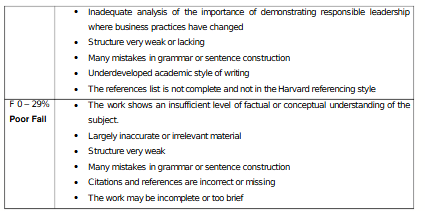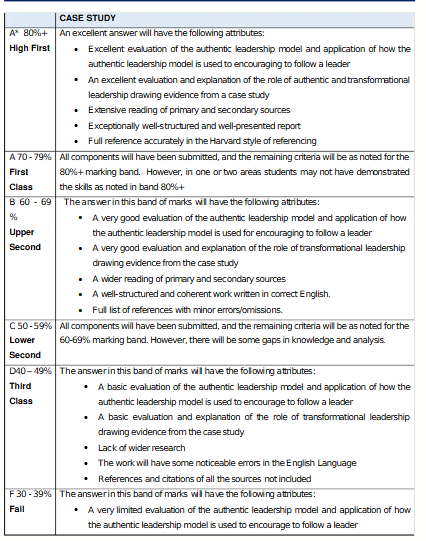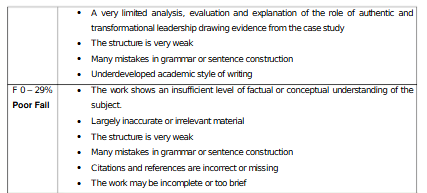| Category | Assignment | Subject | Management |
|---|---|---|---|
| University | University of Chichester | Module Title | LSME601 Leadership: Theory and Practice |
| Programme Title | BSc (Hons) Business Management April 2022 Foundation & April 2025 Top U |
| Submission Deadline |
Assignment 1: Case Study -11\06\2025 Assignment 2: Case Study-16\07\2025 |
| Module Level |
Level 6 |
Upon successful completion of this module, students will be able to:
Views about the appropriate role of leadership reflect the economic, social and political context in which leaders operate. The module examines various theories of leadership with their application to modern-day business situations. In particular, the link between change and the role of leaders in building trust through the exercise of responsible leadership is examined. This is supported by an analysis of the link between effective leadership and personality traits, followership, authentic leadership and transformational leadership.
There are TWO assignments to be completed in this module:
Assignment 1 - (Case Study) 2000 words +/- 10%
Total Weighting: 50%
Intended Learning Outcomes: 1 and 4
Assignment 2-(Case study) 2000 words +/-10%
Total Weighting: 50%
Intended Learning Outcomes: 2 and 3
During the post-pandemic world, Companies emerging from the crisis are realising that they need to prepare, including workforces that require new capabilities to face the digital and environmental future. Industries should develop the talent and knowledge they need. To flourish during and after the pandemic, companies need a new set of skills, including social and emotional, advanced cognitive, and digital capabilities. Using the article as a reference below and other relevant literature, respond to the following assignment 1 (LO1 and LO4).
Kirkham, A. (2021). CFO at Unilever on leadership through a crisis. The CFO Journal. Available at: Cfo At Unilever On Leadership Through A Crisis (Accessed: 14 August 2024).
Gavin van Boekel, the former CFO of Food Solutions at Unilever, discusses the challenges and decisions he faced as a leader of one of the most impacted sectors of the consumer goods giant.
Gavin van Boekel is now CFO of Middle Europe for Unilever, looking after the Benelux, DACH, Italy and Nordics regions. Before moving to this role in September 2020, Gavin was CFO of Food Solutions, the global B2B foods and refreshment business arm of Unilever, and one of the hardest hit during the pandemic. In this case study, Gavin tells us about some of the key decisions and challenges he faced as a leader of such a severely impacted industry, and the importance of encouraging his team to think creatively to continue business in a year of uncertainty and struggle.
Achieve Higher Grades with LSME601 Assignment Solutions
Order Non-Plagiarised AssignmentWhen the pandemic hit in March 2020, we saw an almost immediate closure of the hospitality, travel and tourism industries worldwide. As the Food Solutions division of Unilever, we operate largely within the hospitality industry, so many of our customers - restaurant, bar and café owners - were forced to shut their doors to customers.
This presented two main challenges for us. Firstly, we understandably experienced a significant loss in revenue. Food Solutions always made a healthy profit in the years before the pandemic, and suddenly, we had to handle a new situation where we were losing the same amount in profit per month. This, combined with the vast majority of our customers being closed, meant that we had to deal with a large loss in revenue from March 2020 well into 2021.
Secondly, we were no longer able to rely on conducting business the way we had always done. As a global organisation, we have sales reps placed around the world who are accustomed to visiting customers in person. However, as different countries experienced lockdowns and restrictions on travel were enforced, we were no longer able to safely send our people to our customers. We had to rethink our approach in order to drive business, preserve client relationships and also act responsibly towards our people, given the information we had at the time.
Our number one priority was ensuring our people were safe and could continue to do their work within local restrictions. With thousands of sales reps usually visiting customers in their kitchen or on their premises, we needed to think creatively in order to continue communication effectively and maintain our long-standing customer relationships.
This meant finding ways to adapt and offer our people safer ways of working. To do this, we implemented two models across our different markets. Firstly, where we could, we worked with our IT function to connect people remotely and leverage video functions such as Teams, Zoom and FaceTime. Secondly, while technology is largely available in most of our markets, in some remote areas, such as in South America, it is still a challenge. In this situation, we continued in-person meetings, but we ensured our sales reps were safe by supporting them to take Uber instead of public transport, as well as maintaining social distance when with our customers.
We also needed to think creatively about how to work with Zoom and other virtual communication platforms. Not only did we need to preserve customer relationships, but the nature of the work usually relied on in-person interaction too, e.g. trying different sauces, experimenting with flavours in the kitchen to create the best dish. Continuing this virtually was difficult, and in some cases, Unilever supported sales reps to use services such as Uber to send over goods such as sauces and spices, which they would then discuss with chefs over video or on the phone when it arrived.
Care for our customers was also a key priority for us. Many of our customers are small business owners whose revenues very quickly dried up during the pandemic and who had limited financial resources to fall back on. For most, their fixed costs also remained the same and so we unfortunately saw a lot of customers close their businesses last year.
However, the takeaway industry boomed in 2020 and it was obvious that this was a crucial avenue to make money. For our customers, we offered tips on how to transition from inside dining to takeaway, ensuring their recipes could withstand travel. We also advised our customers on recipes and ingredients that would help them manage waste stemming from the larger fluctuations/uncertainty in demand. As consumer behaviour had changed so dramatically, they needed to align their orders as well as their dishes with what they expected to sell.
As a business, we also needed to explore other avenues to try to make up for the decline in our revenue in existing markets. As such, we worked to explore whether sectors that were still open, such as hospitals and schools, were a viable option. This proved to be successful, as students were staying at boarding
schools for safety, and hospitals were at capacity, which meant that food demand increased. Unilever Food Solutions was in a position to supply for this increased need, and it was a great example of our team coming together to think creatively and strategically about how to move forward.
In the end, this accomplished three key goals. Firstly, we were able to help customers in need to cater for increased demand with solutions and products. This was particularly important as in some markets' supply chains, the availability of produce was getting scarce. Secondly, it provided much-needed new revenue streams for Unilever Food Solutions. Thirdly, it strengthened customer relationships, which is something we are still benefiting from today.
Regarding internal decisions for our employees, when the pandemic hit in March 2020, Unilever decided not to let go of our employees until at least the end of Q2. This was because we didn't feel it was appropriate to send off our people without any salaries or support in such a difficult time. After Q2, as the pandemic continued and we got a clearer picture of our revenue decline, we made the tough decision to let go of some of our third-party workers to curtail our fixed costs. That said, I am proud we could continue to give our people the certainty of employment and hence an income for them and their families.
During my MBA, we were taught crisis management. On one occasion, our lecturer was late, and we were chatting amongst ourselves. Suddenly, the door swung open and a doctor who had just come from the ER walked in. He explained that there is no greater crisis than a human who is about to lose their life and that the key job in the ER was to prevent the patients from dying, not to make the patient better. He explained that these are distinctly different approaches.
I think this is an important approach for any leader and one I try to practice myself. When the pandemic hit the business, I agreed with my CEO that our first and foremost priority was to protect our people, care
for our customers and ensure the viability of the business. All other things came secondary.
This gave us the clarity and prioritisation that guided us through the initial stages of the pandemic and made us focus on what was important. We were also incredibly lucky to be a part of a bigger organisation like Unilever during the pandemic that, despite our revenue loss, supported all of our decisions. Although my unit in B2B was suffering. Unilever was doing well as lockdowns meant people weren't dining outside but instead were eating and cooking at home using different - but still Unilever- products. So in the end, we were quite a balanced company.
I think one permanent benefit of the pandemic is the power of technology to connect people and empower businesses. It was also heavily discussed at Unilever for some time before the pandemic as a potential option to reduce costs and expand our network. However, as a business that relied on collaboration and connection, we thought it couldn't work. But because the pandemic ultimately forced us all to explore that virtual avenue, it has been successful and something I think will now change the way we work moving forward.
As a CFO, my main focus was to find avenues to reduce costs significantly, through people working differently backed by technology, as well as define new revenue options, such as leveraging the takeaway industry. I think we did this successfully, and now, the Food Solutions division is in a better place to move forward.
Once we knew Food Solutions was in a position to weather the storm, I was clear to pass the baton to my successor. In September 2020, I moved from CFO of Food Solutions to CFO of Middle Europe.
At the time, and still today, all employees at Unilever are working from home. It is bizarre for everyone, but particularly leaders, to start a role completely remote and not be able to meet their new team to connect. Without spontaneous, in-person interactions, it is difficult to get a sense of what is going on and fulfil my role of setting people up to do their best.
We are planning agendas through Teams, and although not ideal, I'm looking forward to meeting my team when we are safe to do so and continue to be a successful leader in what are still very uncertain times.
I had a number of key learnings as CFO of the Food Solutions division at Unilever. Firstly, as a leader, I was too lenient and forgiving in the speed of change and implementation. As a business that was always doing well and had a healthy profit pre-pandemic, the need for change was not the biggest priority. Although I wanted to change the business model, I didn't push hard enough to find any inroads pre-COVID, which put us in a reactive rather than proactive position when the pandemic hit in March 2020. The impetus to change should have been clearer earlier, and that will be a key experience that I will take forward for myself as a CFO.
Secondly, I think now more than ever it is important to encourage and cultivate a positive, growth mindset within your team, stimulating creative thinking. As so many of our avenues shut down during the pandemic, it was great to see the team come together to explore different opportunities, and alongside remote working and navigating a new way of collaborating, I thought we did this very well.
Thirdly, the pandemic has highlighted how important it is for a finance leader to be adaptable, resilient and what I like to call a T-shaped professional. This is where the leg of the 'T' is still the core of what makes us great as financial experts, e.g. financial accounting, controls, process knowledge/optimisation etc, However, to succeed in the future, we now need to broaden our experience and skillset. We must gain an understanding of other functions and end-to-end business processes, rather than being, as we have been historically, solely focused on our function. This move to a more rounded individual will ensure we are the future-fit sparring partner to the business.
Take our academic assistance & get 100% plagiarism-free papers
Buy Today, Contact UsYou are required to:
Referring to the case study of how Unilever adapted during a period of uncertainty and struggle, assess the changing perspectives and challenges faced by leadership during the COVID pandemic and for the post-pandemic period. Then, analyse the importance of demonstrating responsible leadership for the post-pandemic period.


Using a case study in a business setting of your choice or within an organisation you currently work or have worked for, you are required to:
Explain and evaluate the concept and application of the 'authentic leadership' model to a change process where stakeholders were encouraged to follow the leaders. (Marks: 50)
Using the same context, evaluate and explain the role of transformational leadership in the change process. (Marks: 50)
You must provide practical examples to explain the application of the theories in your case study report


To complete the tasks, you will need to research different information from diverse sources such as textbooks, academic journals, articles, and the internet. You are also required to develop constructive analytical, critical, and synthesising information processing skills.
Remember that analysis requires you to critically examine different aspects of a topic and identify important issues. Synthesis requires you to summarise the information you have analysed clearly and coherently. Please note: You are encouraged to use the information provided in the assignment brief in your preparation and command verb usage as outlined in your Canvas.
Core Texts
Northouse, P.G. (2022). Leadership: theory and practice. 9th edn. London: SAGE Publications
Yukl, G. A. (2017). Leadership in Organisations. Harlow:
Stuck on your LSME601 Leadership: Theory and Practice? Don't worry! Our Leadership Assignment Help service is the best for you. If you need help with assignments, our expert PhD writers will provide you with original content. And yes, you will also get free assignment samples, which will give you a perfect idea of how to write a top-quality assignment. Don't worry about the deadline, as we guarantee on-time delivery. Contact us now for high-quality and plagiarism-free work and boost your grades!
If you want to see the related solution of this brief then click here:- Leadership
Hire Assignment Helper Today!
Let's Book Your Work with Our Expert and Get High-Quality Content
